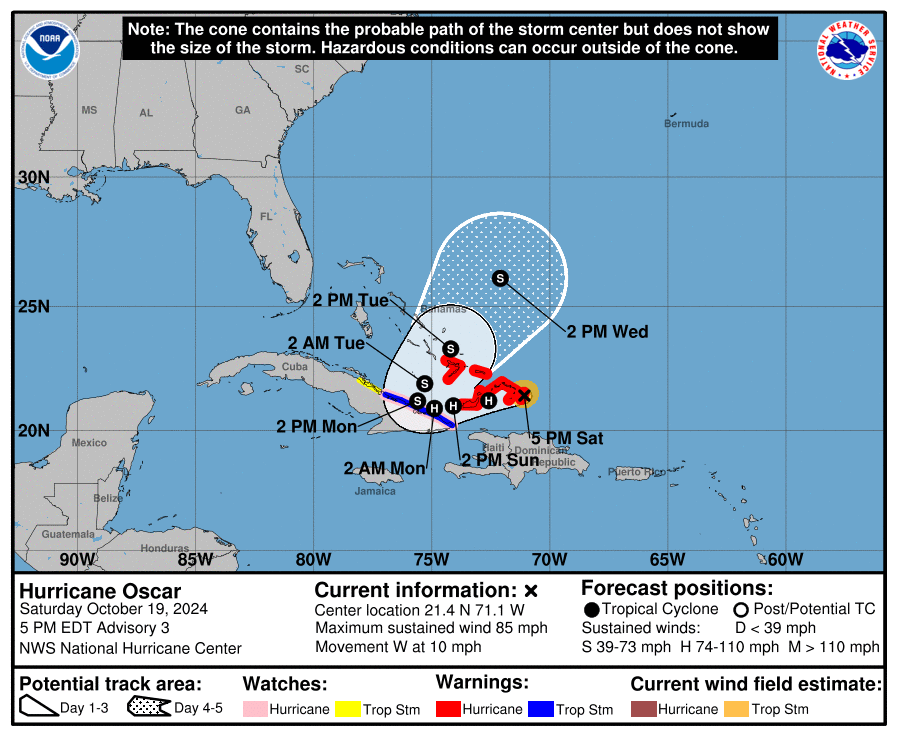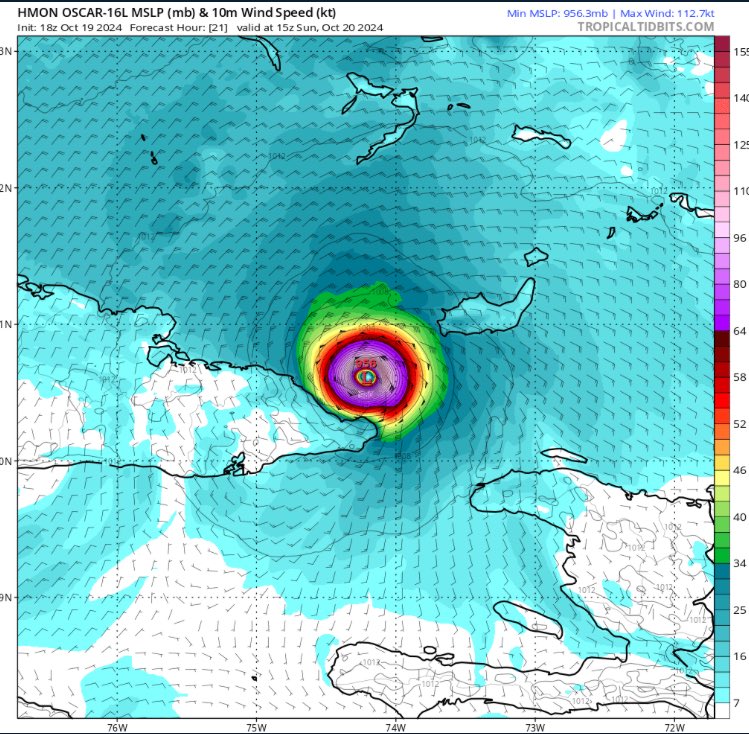Nassau, Bahamas, Oct. 18, 2024 – Hurricane Oscar made landfall in the Bahamas early Thursday, bringing with it powerful winds, torrential rain, and dangerous storm surges. The Category 3 storm struck the southern islands, with the National Hurricane Center (NHC) warning of life-threatening conditions, widespread flooding, and potential damage to homes and infrastructure.
The storm, which had rapidly intensified over the Atlantic Ocean earlier this week, came ashore near Great Exuma with sustained winds of 120 mph (193 km/h). Meteorologists have cautioned that the worst impacts are not over, as heavy rains and high winds will continue throughout the day, posing a severe risk to residents across the archipelago.
Damage Reports and Evacuations Underway
Local authorities have reported significant damage to homes, downed power lines, and roads submerged by rising floodwaters. Thousands of residents in the southern islands were urged to evacuate ahead of the storm, with temporary shelters set up in Nassau and other safer areas. However, officials warn that communication with the most affected regions remains limited, making it difficult to assess the full extent of the damage.
“We are facing a dangerous situation, and we urge everyone to stay indoors and follow all emergency instructions,” said Prime Minister Philip Davis in a public statement. “Our priority is to keep everyone safe and respond swiftly to those in need.”
Coastal areas have been hit particularly hard, with storm surges of up to 12 feet (3.6 meters) reported in low-lying regions. Residents are being advised to avoid floodwaters, as emergency responders are stretched thin dealing with power outages and blocked roads.

Flight Cancellations and Disruptions
Oscar’s arrival has forced the closure of airports across the Bahamas, disrupting travel and delaying rescue operations. Commercial flights to and from the islands were canceled, and cruise ships in the region were redirected to avoid the storm’s path.
In Nassau, businesses and government offices have been shuttered as residents brace for additional impacts, with power outages reported in several districts. Local authorities have advised people to stock up on food and water, warning that it may take time for services to be fully restored.
Bahamas Prepares for the Worst
The Bahamas, still recovering from the devastation caused by Hurricane Dorian in 2019, is no stranger to powerful storms. While Oscar is not expected to reach Dorian’s catastrophic levels, officials are taking no chances and have mobilized emergency response teams across the islands.
“We’ve learned hard lessons from past hurricanes,” said Captain Stephen Russell, head of the Bahamas National Emergency Management Agency (NEMA). “Our teams are on high alert, and we are coordinating with international partners to ensure we have resources in place for a swift response.”
Storm to Weaken as It Moves Inland
The NHC predicts that Oscar will weaken as it moves inland and northward through the Bahamas, though heavy rain will persist over the next 24 to 48 hours. Flash flooding remains a major concern, especially in areas already saturated by recent rainfall.
The storm is expected to continue along a northeast trajectory, potentially impacting parts of the southeastern United States, where tropical storm watches have been issued. Coastal communities in Florida, Georgia, and South Carolina are closely monitoring Oscar’s progress, with officials preparing for possible heavy rainfall and flooding later this week.

Global Aid on Standby
International aid organizations have begun mobilizing to assist the Bahamas in the aftermath of the storm. The Red Cross and several other NGOs have pre-positioned supplies, including food, water, and medical kits, to assist with recovery efforts. The U.S. Coast Guard has also deployed helicopters to the region to assist in search-and-rescue operations if needed.
A Critical Test for the Bahamas
Hurricane Oscar’s landfall serves as a stark reminder of the vulnerability of island nations to extreme weather events. As climate change continues to increase the frequency and intensity of hurricanes, the Bahamas must balance immediate recovery efforts with long-term strategies to strengthen infrastructure and protect communities.
For now, the priority remains saving lives and stabilizing the situation. Prime Minister Davis assured the public that the government will do everything possible to assist those affected, saying, “We are resilient people, and together, we will get through this storm.”
Residents and visitors are being urged to monitor weather alerts and heed instructions from local authorities as Hurricane Oscar continues to batter the islands.
